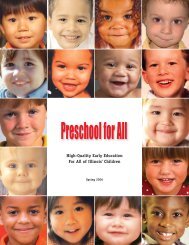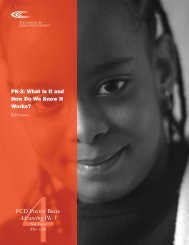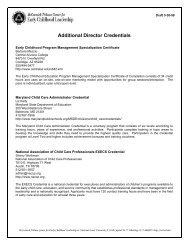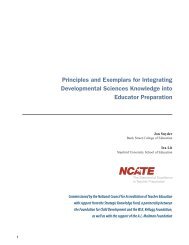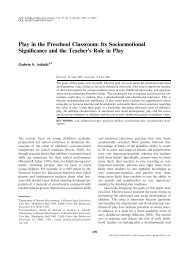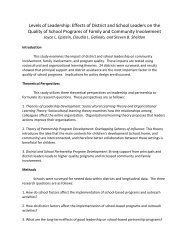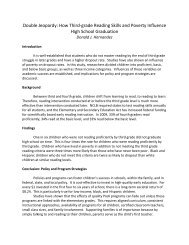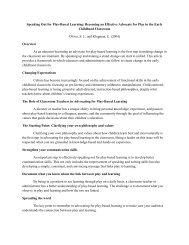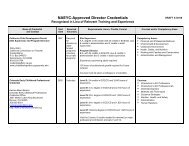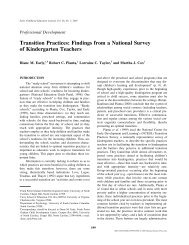<strong>Pre</strong>school Policy Brief March 2004N<strong>in</strong>e Keys to Effective <strong>Pre</strong>k<strong>in</strong>dergarten <strong>Standards</strong> (cont<strong>in</strong>ued)87 8<strong>Standards</strong> must be written <strong>in</strong> a way that makesit possible to assess whether they are be<strong>in</strong>g met <strong>in</strong> aclassroom.For standards to strengthen <strong>in</strong>struction and boost achievementthey must be amenable to assessment. Schoolsand programs must be able to document both programstandards (the resources, activities, and <strong>in</strong>struction programsprovide to help children learn) and child outcome standards(the knowledge, skills, and dispositions children demonstrate).All assessments need to be fair and technically sound.Assessment policies related to children with special needsor English language learners should be clearly set out.For preschoolers… Assessment presents one of the toughestchallenges <strong>for</strong> states as they <strong>in</strong>troduce preschool outcomestandards. Educators and parents have many concernsabout the appropriateness of standardized read<strong>in</strong>ess tests<strong>for</strong> preschoolers. They also worry about the potential misuseof assessments to label young children or delay k<strong>in</strong>dergartenentry. 13Us<strong>in</strong>g outcome standards <strong>for</strong> accountability purposes is animportant part of standards-based re<strong>for</strong>m, 22 but us<strong>in</strong>g themto evaluate early childhood programs presents seriousproblems. Many early childhood assessment experts agreethat most standardized <strong>in</strong>struments cannot yield valid andreliable data on young children’s learn<strong>in</strong>g outcomes and atthe same time be cost-effective enough to be used on a largescale to compare different programs. 22,23In some areas, such as f<strong>in</strong>e motor skills or literacy skills, theconnection between the standard and assessment is relativelyclear. The challenge is to select the best method <strong>for</strong> measur<strong>in</strong>gchildren’s knowledge of pr<strong>in</strong>t or their mastery of hand-eyecoord<strong>in</strong>ation. In other areas, such as social and emotionaldevelopment, standards are often written <strong>in</strong> a more generalway, and this makes it harder to assess children’s progress<strong>in</strong> meet<strong>in</strong>g the standards. In this case, accompany<strong>in</strong>g documentsare needed that specify per<strong>for</strong>mance standards, whichdescribe the level at which children should be able to per<strong>for</strong>mand ways to assess their progress.Because the assessment of young children presents so manychallenges, experts advise that standardized tests be used spar<strong>in</strong>gly<strong>for</strong> accountability purposes. States or districts may wantto test a randomly identified number of children attend<strong>in</strong>ga specific program, rather than test<strong>in</strong>g every child. Moreover,they advise aga<strong>in</strong>st look<strong>in</strong>g at assessment solely as an accountabilityor program evaluation tool. This narrow view overlooksthe benefits children derive when assessments helpprograms and teachers strengthen children’s classroomexperiences.Standard documents should dist<strong>in</strong>guish clearlybetween program standards and outcome standards.Those who establish standards need to differentiate betweenstandards that specify “<strong>in</strong>puts” (such as the number of hourschildren spend <strong>in</strong> an educational program, the qualificationsof the teachers, or the materials and resources provided)and standards that <strong>in</strong>dicate “outputs” (what children knowand can do as a result of participation).For preschoolers… This dist<strong>in</strong>ction is particularlyimportant. While preschool program standards have existed<strong>for</strong> many years, the use of child outcome standards isrelatively new. Because both are important, states need to draftseparate documents <strong>for</strong> program standards and child outcomestandards. As th<strong>in</strong>gs stand, some states have mixed both typesof standards <strong>in</strong> the same document, caus<strong>in</strong>g considerableconfusion <strong>for</strong> the public and those who implement the standards— whether policymakers, program directors, teachers,or evaluators.9<strong>Child</strong> outcome standards should be designed <strong>in</strong>ways that offer benefits beyond strengthen<strong>in</strong>gaccountability.Researchers have noted that child outcome standards “havepotential benefits beyond address<strong>in</strong>g pressures <strong>for</strong> <strong>in</strong>creasedaccountability.” 1 For example, they can support curriculumdevelopment and focus attention on important aspects ofchildren’s growth and development.For preschoolers… Reach<strong>in</strong>g consensus on outcomesstandards can help states, communities, and programsto enhance public understand<strong>in</strong>g of early developmentand learn<strong>in</strong>g; strengthen curriculum development andprofessional development; <strong>in</strong><strong>for</strong>m primary gradecurriculum development; and improve transition tok<strong>in</strong>dergarten.
<strong>Pre</strong>school Policy Brief March 2004SummaryCreat<strong>in</strong>g preschool outcome standards poses many of the same challenges faced by policymakers and educators as they set standards<strong>for</strong> K-12 and beyond. At the same time, preschool standards present special considerations related to both the nature ofearly development and learn<strong>in</strong>g and the characteristics of early childhood programs. Absent attention to these considerations,educators may fail to extend to young children all of the benefits that standards-based education has to offer. Indeed, apply<strong>in</strong>gstandards without regard to the unique challenges of early childhood education may have adverse effects on children <strong>in</strong> the longrun. If policymakers and early childhood educators take an approach that reflects today’s best understand<strong>in</strong>gs of early childhooddevelopment and high-quality early education, everyone stands to ga<strong>in</strong>.Policy Recommendations• Because standards reflect the values of the people who set them, collaboration with families and communities is a keyto the successful design and implementation of preschool standards.• <strong>Standards</strong> documents should dist<strong>in</strong>guish clearly between program standards and child outcome standards.• <strong>Outcome</strong> standards need to be written <strong>in</strong> ways that take <strong>in</strong>to account the unique ways that young children develop and learn,consider<strong>in</strong>g all aspects of school read<strong>in</strong>ess identified by the <strong>National</strong> Education Goal Panel.• <strong>Standards</strong> that address physical health, social-emotional development, and approaches to learn<strong>in</strong>g need to have as muchemphasis and specificity as those that address cognitive and language development.• <strong>Standards</strong> should allow <strong>for</strong> a coherent educational experience. <strong>Pre</strong>school standards should allow cont<strong>in</strong>uity with k<strong>in</strong>dergartenstandards, but not at the expense of attention to physical and social-emotional development.• <strong>Standards</strong> should be written <strong>in</strong> ways that allow <strong>for</strong> appropriate, effective assessment. Assessment policies and practices shouldgo beyond accountability to foster program improvement.9




